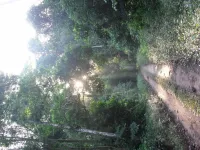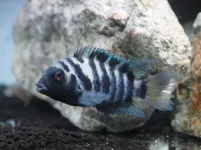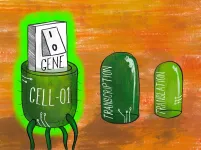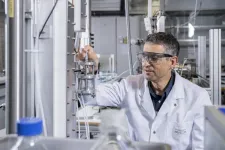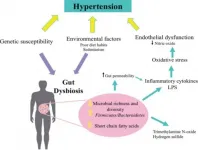SFU lab one step closer to understanding how life started on Earth
Researchers at Simon Fraser University have isolated a genetic clue--an enzyme known as an RNA polymerase--that provides new insights about the origins of life.
2021-03-19
(Press-News.org) How did life begin on Earth and could it exist elsewhere? Researchers at Simon Fraser University have isolated a genetic clue--an enzyme known as an RNA polymerase--that provides new insights about the origins of life. The research is published today in the journal Science.
Researchers in SFU molecular biology and biochemistry professor Peter Unrau's laboratory are working to advance the RNA World Hypothesis in answer to fundamental questions on life's beginnings.
The hypothesis suggests that life on our planet began with self-replicating ribonucleic acid (RNA) molecules, capable of not only carrying genetic information but also driving chemical reactions essential for life, prior to the evolution of deoxyribonucleic acid (DNA) and proteins, which now perform both functions within our cells.
Through a process of in vitro evolution in the lab, the team has isolated a promoter-based RNA polymerase ribozyme--an enzyme capable of synthesizing RNA using RNA as a template--that has processive clamping abilities that are equivalent to modern-day protein polymerases.
"This RNA polymerase has many of the features of modern protein polymerases; it was evolved to recognize an RNA promoter, and subsequently, to copy RNA processively," says Unrau. "What our finding implies is that similar RNA enzymes early in the evolution of life could also have manifested such sophisticated biological features."
There is evidence that suggests RNA came before DNA and proteins. For example, the ribosome, the 'machine' that makes proteins in our cells, is built from RNA. Yet proteins are better at catalyzing reactions.
This has led experts to theorize that this machine was an invention of the late RNA world that was never discarded by evolution.
DNA is also made from RNA. Since RNA is a jack-of-all-trades and can perform the functions of both protein and DNA, this suggests that DNA and proteins evolved later as an 'upgrade' to enhance cellular functions originally supported by RNA.
The clamping polymerase ribozyme discovered by Unrau's laboratory, located within SFU's Burnaby campus, indicates that RNA replication by RNA catalysts indeed might have been possible in such primitive life.
Unrau and his team's long-term goal is to build a self-evolving system in the lab. This would involve creating an RNA polymerase ribozyme that can also replicate and sustain itself, to gain a deeper understanding of how early RNA-based organisms came into being.
"If we are able to create a living and evolving RNA-based system in the laboratory we'd have made something quite remarkable, something that has probably has never existed since the dawn of life on this planet," says Unrau, who wrote the Science article with SFU PhD student Razvan Cojocaru.
"By understanding the fundamental complexity of life, in the laboratory, we can start to estimate the chances of life on other planets and determine the likelihood that planets such as Mars either had or still have the potential to harbor life."
INFORMATION:
ELSE PRESS RELEASES FROM THIS DATE:
2021-03-19
In the future, droughts could be even more severe than those that struck parts of Germany in 2018. An analysis of climate data from the last millennium shows that several factors have to coincide to produce a megadrought: not only rising temperatures, but also the amount of solar radiation, as well as certain meteorological and ocean-circulation conditions in the North Atlantic, like those expected to arise in the future. A group of researchers led by the Alfred Wegener Institute have just released their findings in the journal Communications Earth & Environment.
Despite the precipitation this winter, which in ...
2021-03-19
Large areas of forests regrowing in the Amazon to help reduce carbon dioxide in the atmosphere, are being limited by climate and human activity.
The forests, which naturally regrow on land previously deforested for agriculture and now abandoned, are developing at different speeds. Researchers at the University of Bristol have found a link between slower tree-growth and land previously scorched by fire.
The findings were published today [date] in Nature Communications, and suggest a need for a better protection of these forests if they are to help mitigate the effects of climate change.
Global forests are expected to contribute a quarter of pledged mitigation under the ...
2021-03-19
OSAKA, Japan. If you were given the option to eat a delicious meal by yourself, or share that meal with your loved ones, you would need as very good excuse ready if you chose the former. Turns out, fish share a similar inclination to look after each other.
For the first time ever, a research group led by researcher Shun Satoh and Masanori Kohda, professor of the Graduate School of Science, Osaka City University, have shown these altruistic tendencies in fish through a series of prosocial choice tasks (PCT) where they gave male convict cichlid fish two choices: the antisocial option of receiving food for themselves alone and the prosocial option of receiving food for themselves and their partner.
"As a result, it can be said that the convict cichlid ...
2021-03-19
In a recent study led by the University of Bristol, scientists have shown how to simultaneously harness multiple forms of regulation in living cells to strictly control gene expression and open new avenues for improved biotechnologies.
Engineered microbes are increasingly being used to enable the sustainable and clean production of chemicals, medicines and much more. To make this possible, bioengineers must control when specific sets of genes are turned on and off to allow for careful regulation of the biochemical processes involved.
Their findings are reported today in the journal Nature Communications.
Veronica Greco, lead author ...
2021-03-19
Scientists have discovered in more detail than ever before how the human body's immune system reacts to malaria and sickle cell disease.
The researchers from the universities of Aberdeen, Edinburgh, Exeter and Imperial College, London have published their findings in Nature Communications.
Every year there are ~200 million cases of malaria, which causes ~400,000 deaths.
As it causes resistance against malaria, the sickle cell disease mutation has spread widely, especially in people from Africa.
But if a child inherits a double dose of the gene - from both mother and father - they will develop ...
2021-03-19
Researchers at the Paul Scherrer Institute PSI have for the first time observed photochemical processes inside the smallest particles in the air. In doing so, they discovered that additional oxygen radicals that can be harmful to human health are formed in these aerosols under everyday conditions. They report on their results today in the journal Nature Communications.
It is well known that airborne particulate matter can pose a danger to human health. The particles, with a maximum diameter of ten micrometres, can penetrate deep into lung tissue and settle ...
2021-03-19
Sabrina L. Spencer, PhD, is a CU Boulder researcher and a CU Cancer Center member. Spencer recently won two awards: the Damon Runyon-Rachleff Innovation Award (from the Damon Runyon Cancer Research Foundation) and the Emerging Leader Award (from The Mark Foundation for Cancer Research). The preliminary research she used to apply for the grants, "Melanoma subpopulations that rapidly escape MAPK pathway inhibition incur DNA damage and rely on stress signalling," was published in Nature Communications on March 19, 2021. We spoke to Spencer about the awards and how she plans to use them to ...
2021-03-19
Researchers looking at miniscule levels of plutonium pollution in our soils have made a breakthrough which could help inform future 'clean up' operations on land around nuclear power plants, saving time and money.
Publishing in the journal Nature Communications, researchers show how they have measured the previously 'unmeasurable' and taken a step forward in differentiating between local and global sources of plutonium pollution in the soil.
By identifying the isotopic 'fingerprint' of trace-level quantities of plutonium in the soil which matched the ...
2021-03-19
A study of Japanese university students and recent graduates has revealed that writing on physical paper can lead to more brain activity when remembering the information an hour later. Researchers say that the unique, complex, spatial and tactile information associated with writing by hand on physical paper is likely what leads to improved memory.
"Actually, paper is more advanced and useful compared to electronic documents because paper contains more one-of-a-kind information for stronger memory recall," said Professor Kuniyoshi L. Sakai, a neuroscientist at the University of Tokyo and corresponding author of the research recently published in Frontiers in Behavioral Neuroscience. The research was completed with collaborators from the NTT Data Institute of Management Consulting.
Contrary ...
2021-03-19
Philadelphia, March 19, 2021 - In recent years, fermented dairy foods have been gaining attention for their health benefits, and a new review published in the Journal of Dairy Science indicates these foods could help reduce conditions like hypertension (high blood pressure). A team of investigators from the Center for Food Research and Development in Sonora, Mexico, and the National Technological Institute of Mexico in Veracruz reports on numerous studies of fermented milks as antihypertensive treatments and in relation to gut microbiota modulation. They also examine the potential mechanistic pathways of gut modulation through antihypertensive fermented milks.
In addition to the impact of genetics and the environment, there is growing ...
LAST 30 PRESS RELEASES:
[Press-News.org] SFU lab one step closer to understanding how life started on Earth
Researchers at Simon Fraser University have isolated a genetic clue--an enzyme known as an RNA polymerase--that provides new insights about the origins of life.
